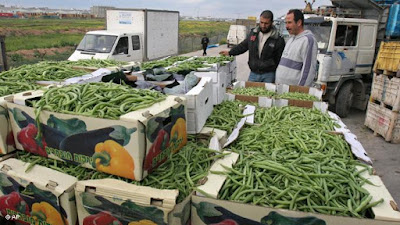It’s easy
to assume that nothing much goes on in the Palestinian territories other than
war and violence. But the German enterprise software giant SAP has spotted an
opportunity there.
Murad
Tahboub is the first to admit that the year 2000 was not a good time to start
his IT services business in Palestine.
"It
was just before the second intifada, so it took us a long time to get going,
and it wasn't until 2005 that we started landing some serious export
business," said Tahboub.
"Even
now, it's a challenge overcoming the stereotypes about Palestine. But our
company ASAL Technologies has been growing healthily for the last ten years. We
started with 10 employees, and today it's more than 150."
Tahboub's
business is not an isolated example. Despite periodic outbreaks of fighting
between Israel and the Palestinians (the most recent being Israel's offensive
against Gaza last year) there is a flourishing IT software industry in
Palestine, and its universities turn out more than 2,000 graduates in
IT-related subjects every year.
Strong
startup scene
The
industry's strengths lie in software development in all areas, and there's a
lively startup sector of small businesses with bright ideas looking for
investors to take them to the next stage of growth.
So although
a recent initiative by SAP may have raised eyebrows elsewhere, in Palestine
it's seen as due recognition for their growing IT muscle. In 2005, information
and communications technology (ICT) was worth $112 million (98.6 million euros)
in added value to the economy; by 2013, it was $453 million at constant prices,
according to the Palestinian Central Bureau of Statistics. ICT accounts for
about six per cent of GDP.
The SAP
deal is this: in the last few weeks, eight Palestinian universities have joined
SAP's University Alliances program to develop graduates with critical IT
skills. Palestinian graduates will also be recruited into SAP's Young
Professional Program, where they'll receive training in SAP solutions and
tools.
Although
there is no guarantee of jobs with SAP, the graduates will effectively be part
of the software giant's push into the whole of the Middle East. It has around
1,350 customers there already and the region is one of SAP's fastest-growing
markets.
 |
| Unknown to many, Palestine's economy is more than just vegetable growing |
So it was a
hard-headed business decision, but Senior Vice President for Strategic
Investments Marita Mitschein prefers to emphasise the social benefits.
"SAP believes in the importance of IT to shape people's lives in the
Middle East and we are proud to play a part in doing that in Palestine,"
she said.
On the
ground in Palestine, they don't disguise their pleasure at SAP's move.
"It's significant for the training of our graduates, but the connections
that SAP partners will make with each other are more important," said
Yahya Al-Salqan, chairman of the 150-strong Palestinian IT Association.
"It
will be a network that will help us build a strong industry in the region, and
we need that to hold on to our brightest graduates. They often have to go
abroad to get a job. We have lots of bright people, a reputation for quality
and great value because our costs are about half the costs in Europe and the
US."
Outside
help
SAP and
Palestinian IT didn't just fall into each other's arms. The marriage broker was
the Office of the Quartet Representative (OQR), which has a brief to promote
economic development. Tony Blair is currently the Representative and the
Quartet was set up by the EU, the UN, the USA and Russia. The OQR brought in
David Dick, an IT industry executive, to attract the world's big IT players to
the region – the likes of Hewlett Packard, IBM, Microsoft and SAP.
"I've
had a whole career in IT, so I've been engaging with senior IT execs to
persuade them about the opportunities in Palestine. SAP were quick to offer
their support and they put me in touch with their Middle East business and
their worldwide university training team," said David Dick.
"The
key to drawing in the big global businesses is to get Palestine onto their
radar. They already place much of their support work in low-cost locations
anyway, so it's not difficult for them to add Palestine to the mix. SAP is just
the first, and we hope to make another announcement soon."
Back in
Ramallah, Murad Tahboub is brimming with optimism. "The SAP initiative is
a wakeup call to all multinationals to take a look at the valuable resource we
have here. Things are looking rosy for the IT sector here, and despite all the
obstacles, I believe that the generation of jobs is the key element for peace
and prosperity in the region."





No comments:
Post a Comment